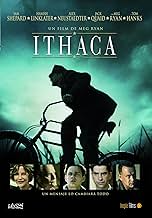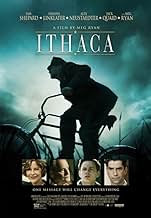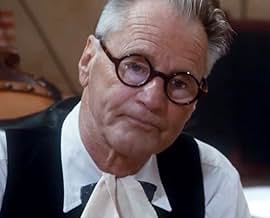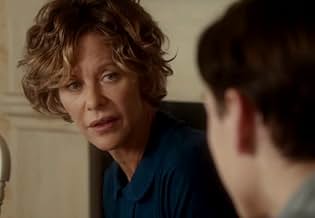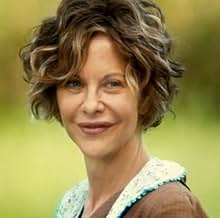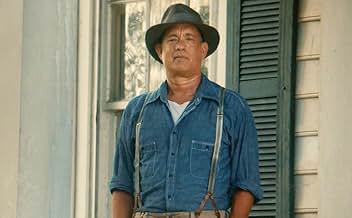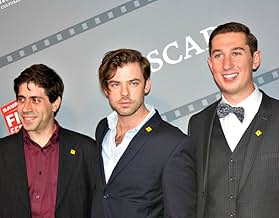IMDb RATING
5.5/10
3.3K
YOUR RATING
With his older brother off to war, fourteen-year-old telegram messenger Homer Macauley comes of age in the summer of 1942.With his older brother off to war, fourteen-year-old telegram messenger Homer Macauley comes of age in the summer of 1942.With his older brother off to war, fourteen-year-old telegram messenger Homer Macauley comes of age in the summer of 1942.
- Awards
- 2 nominations total
- Director
- Writers
- All cast & crew
- Production, box office & more at IMDbPro
Featured reviews
It is good to see that there is movies made not for sale. Movies that bring some meaning and help to think. My English is poor so I cant good express myself, but I hope main point is clear. This movie will make you think,will leave something after to think about. And it is much deeper that it looks at the first time. War is big problem, and it is still actual , right now there is so many fights, pain, destroyed families, and people avoid to think about it. It is not fun, it is not comfortable, it is better pretend that its not exist. Thats why I think this kind of films will make word a bit better. Thanks to everyone who invested to this film.
This film tells the story of a fourteen year old boy, who takes up the job as a messenger to deliver telegraphs back in the dark times of the second world war.
The book might have been touching, but this film unfortunately does not work. The story does not seen to go anywhere. It doesn't develop the characters, and viewers don't understand why any of the characters are at the point that they are at. Why does the boy need to take up a job? Why does the older guy drink so much? What about the other messenger? The lack of background information makes me feel distant from the characters.
It takes forty minutes of screen time to deliver the second telegraph. That's way too long for a film about a boy delivering telegraphs. The film could have explored more on how the sad telegraphs affected him, so there's wasted opportunity. I watched the film for Tom Hanks, and I don't even recall him having said a word!
The book might have been touching, but this film unfortunately does not work. The story does not seen to go anywhere. It doesn't develop the characters, and viewers don't understand why any of the characters are at the point that they are at. Why does the boy need to take up a job? Why does the older guy drink so much? What about the other messenger? The lack of background information makes me feel distant from the characters.
It takes forty minutes of screen time to deliver the second telegraph. That's way too long for a film about a boy delivering telegraphs. The film could have explored more on how the sad telegraphs affected him, so there's wasted opportunity. I watched the film for Tom Hanks, and I don't even recall him having said a word!
Meg Ryan did an awesome job directing this movie. I was pleasantly surprised by the characters, the cinematography, lighting and superb story line. So many movies are predictable with the same dramas, with the same cliches while this one had a fresh approach. The feeling of the small town with divisions, logistics of war, the telegraph business of the time, the youth becoming an adult in ways so different than most films was captured with beautiful motion. The actors had real approach, timing and freshness. All in all, a wonderful movie.
Greetings again from the darkness. The source material is the 1943 novel "The Human Comedy" from Pulitzer Prize winning writer William Saroyan; and it's the directorial debut of Meg Ryan, the one-time 'America's Sweetheart' who reunites with her Sleepless in Seattle co-star Tom Hanks (in a ghostly cameo). Due to these juicy ingredients, we can be excused if our expectations are a bit high.
As a viewer, it's easy to relate to the emotions of young Homer McCauley (Alex Neustaedter) as his messenger job expedites the disillusionment that often accompanies adulthood. While Homer becomes more disenchanted the more he learns, we feel let down with each successive sequence. The adapted screenplay from Eric Jendresen never picks a direction, and instead teases us with numerous pieces from the novel with little follow through on any.
Homer's dad (a very brief Tom Hanks apparition) has recently passed, and with his older brother Marcus (Jack Quaid, son of Meg Ryan and Dennis Quaid) off at war, Homer takes it upon himself to secure a job to help support his saintly and melancholy mother (Meg Ryan), his older sister Bess (Christine Nelson) and his little brother Ulysses (an energetic Spencer Howell). He pledges to be the best bicycle messenger ever when hired at the local telegraph company run by Tom Spangler (Hamish Linklater) and old-timer (grumpy and frequently inebriated) Willie (Sam Shepard).
Being that it's war time, some of the telegraphs Homer must deliver are the worst possible news for the parents on the receiving end. As the film progresses, we see the light slowly go out of Homer's once bright eyes. The accelerated coming-of-age aspect is at its best when his father-figure Willie brusquely tells him "You are 14 years old and you're a man! I don't know who made you that way." It's the most poignant moment of the film and the closest we get to a real theme.
The letters Homer receives from older brother Marcus contribute to his understanding of the world and the reading of the letters serves the purpose of story narration. The film is nostalgic and idealistic, but so unfocused that we are never able to fully connect with any of the characters. We are caught off guard when Homer proclaims his mother as the nicest person ever, although she has offered even less guidance than Forrest Gump's mom. Ithaca, Ulysses, and Homer we can't miss the mythology ties, as well as the importance of home, but it always feels like something is missing.
In 1943, six time Oscar nominee Clarence Brown made a movie based on this same novel, and the cast included Mickey Rooney, Frank Morgan, Donna Reid and Van Johnson. In this new version, John Mellencamp provides the musical score, and Ms. Ryan has stated that the novel helped her work through a difficult time in her personal life. She's likely to get more opportunities to direct; her first outing is easy enough to watch, but just as easy to forget.
As a viewer, it's easy to relate to the emotions of young Homer McCauley (Alex Neustaedter) as his messenger job expedites the disillusionment that often accompanies adulthood. While Homer becomes more disenchanted the more he learns, we feel let down with each successive sequence. The adapted screenplay from Eric Jendresen never picks a direction, and instead teases us with numerous pieces from the novel with little follow through on any.
Homer's dad (a very brief Tom Hanks apparition) has recently passed, and with his older brother Marcus (Jack Quaid, son of Meg Ryan and Dennis Quaid) off at war, Homer takes it upon himself to secure a job to help support his saintly and melancholy mother (Meg Ryan), his older sister Bess (Christine Nelson) and his little brother Ulysses (an energetic Spencer Howell). He pledges to be the best bicycle messenger ever when hired at the local telegraph company run by Tom Spangler (Hamish Linklater) and old-timer (grumpy and frequently inebriated) Willie (Sam Shepard).
Being that it's war time, some of the telegraphs Homer must deliver are the worst possible news for the parents on the receiving end. As the film progresses, we see the light slowly go out of Homer's once bright eyes. The accelerated coming-of-age aspect is at its best when his father-figure Willie brusquely tells him "You are 14 years old and you're a man! I don't know who made you that way." It's the most poignant moment of the film and the closest we get to a real theme.
The letters Homer receives from older brother Marcus contribute to his understanding of the world and the reading of the letters serves the purpose of story narration. The film is nostalgic and idealistic, but so unfocused that we are never able to fully connect with any of the characters. We are caught off guard when Homer proclaims his mother as the nicest person ever, although she has offered even less guidance than Forrest Gump's mom. Ithaca, Ulysses, and Homer we can't miss the mythology ties, as well as the importance of home, but it always feels like something is missing.
In 1943, six time Oscar nominee Clarence Brown made a movie based on this same novel, and the cast included Mickey Rooney, Frank Morgan, Donna Reid and Van Johnson. In this new version, John Mellencamp provides the musical score, and Ms. Ryan has stated that the novel helped her work through a difficult time in her personal life. She's likely to get more opportunities to direct; her first outing is easy enough to watch, but just as easy to forget.
'There will always be pain in this world, Homer. And a good man will seek to take the pain out of things.' William Saroyan's 1943 novel THE HUMAN COMEDY, a quiet, gentle statement of finding meaning in becoming a man, has been lovingly and subtly transformed into a film by Erik Jendresen and directed with straightforward simplicity by Meg Ryan. Some viewers fine this film slow and lifeless, but the true beauty of this little gem is that the actors, director, cinematographer and production crew allow it to let the tine slice of Americana speak for itself.
The year is 1942 and the film opens with black and white broadcasts by President Roosevelt about the tragedy of Pearl Harbor. We meet the Macauley family. Fourteen- year-old Homer Macauley (Alex Neustaedter) is determined to be the best and fastest bicycle telegraph messenger anyone has ever seen. His older brother Marcus (Jack Quaid) has gone to war, leaving Homer to look after his widowed mother (Meg Ryan – his father appears as Tom Hanks), his older sister Bess (Christine Nelson) and his 4-year-old brother, Ulysses (Spencer Howell). And so it is that as spring turns to summer, 1942, Homer Macauley delivers messages of love, hope, pain... and death... to the good people of Ithaca. His telegraph office is run buy the elderly Grogan (Sam Shepard) and Tom Spangler (Hamish Linklater) who are supportive of their underage worker, offering sage advice and love to a frightened lad. Homer will grapple with one message that will change him forever. ITHACA is a coming-of-age story about the exuberance of youth, the abruptness of change, the sweetness of life, the sting of death, and the sheer goodness that lives in each and every one of us.
Put away your need for high action films and comic book heroes and CGI effects and re- visit a time in America when small towns reflected the strengths of youngsters and families affect by World War II. The film is deeply moving.
The year is 1942 and the film opens with black and white broadcasts by President Roosevelt about the tragedy of Pearl Harbor. We meet the Macauley family. Fourteen- year-old Homer Macauley (Alex Neustaedter) is determined to be the best and fastest bicycle telegraph messenger anyone has ever seen. His older brother Marcus (Jack Quaid) has gone to war, leaving Homer to look after his widowed mother (Meg Ryan – his father appears as Tom Hanks), his older sister Bess (Christine Nelson) and his 4-year-old brother, Ulysses (Spencer Howell). And so it is that as spring turns to summer, 1942, Homer Macauley delivers messages of love, hope, pain... and death... to the good people of Ithaca. His telegraph office is run buy the elderly Grogan (Sam Shepard) and Tom Spangler (Hamish Linklater) who are supportive of their underage worker, offering sage advice and love to a frightened lad. Homer will grapple with one message that will change him forever. ITHACA is a coming-of-age story about the exuberance of youth, the abruptness of change, the sweetness of life, the sting of death, and the sheer goodness that lives in each and every one of us.
Put away your need for high action films and comic book heroes and CGI effects and re- visit a time in America when small towns reflected the strengths of youngsters and families affect by World War II. The film is deeply moving.
Did you know
- GoofsWhen they are in the cinema watching the newsreel, there's a shot of a man carrying a wounded solider across a river. The commentary states "when this country was extending a helping hand."
That shot is actually of an Australian soldier helping a wounded Australian in the Kokoda campaign in New Guinea. The film is footage from Kokoda Front Line, by Damian Parer, who was an Australian combat camera man.
- Quotes
Mrs. Macauley: There will always be pain in this world, Homer. And a good man will seek to take the pain out of things.
- How long is Ithaca?Powered by Alexa
Details
Box office
- Budget
- $5,000,000 (estimated)
- Runtime1 hour 36 minutes
- Color
- Aspect ratio
- 2.35 : 1
Contribute to this page
Suggest an edit or add missing content


